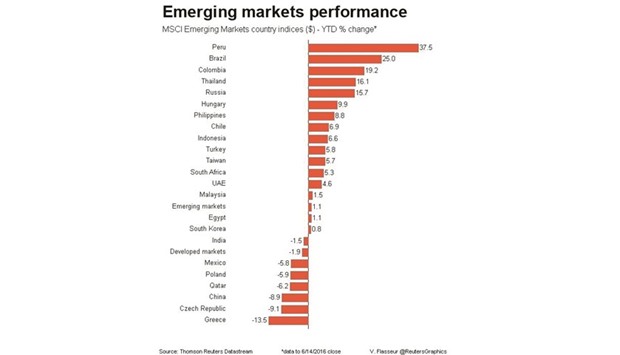Emerging market stocks snapped a four day-losing streak yesterday, as investors anticipated a soothing message later from the US Federal Reserve to help settle the current outbreak of Brexit nerves.
With the Fed widely expected to kept its interest rates on hold for at least another month and markets going into their usual lull ahead of the decision, EM stocks clawed back 0.3% of their more than 5% lost since Thursday.
There was further reassurance as China’s markets shrugged off equity index provider MSCI’s surprise decision not to add domestically-listed Chinese A-Shares to its widely followed benchmark EM index yet.
market-watchers and analysts said the move, the third year running it has said no, highlighted reservations among global institutional investors following a turbulent 12 months of market slumps and share suspensions.
“There have been a lot of significant improvements made recently by the Chinese authorities to improve accessibility for global investors; however, some of them are relatively recent, so we need a little bit of time to assess the effectiveness of these measures,” Remy Briand, MSCI global head of research, told reporters.
Chinese markets ended the day roughly 1% higher, bolstered in part by central bank’s fixing of the official yuan exchange rate against the dollar at a five-year low.
South Korea’s won fell to a near two-week trough, while the Indonesian rupiah slipped to its weakest in more than a week ahead of a central bank rate decision today.
Eastern Europe’s currency markets were steadier after a turbulent few days linked to worries about Britain’s June 23 vote on its European Union membership.
Options on Polish zloty volatility edged back from four-year highs and shares across the region and in Russia nudged higher. More than 800,000 Poles live in the UK and around 7% of Polish exports go there.
Spot FX and stock markets also made ground, with both the rouble and zloty up for the first time in four days against the dollar.
Stocks in Moscow and Warsaw snapped three- and four-day losing streaks respectively, while average government bond spreads tightened fractionally.
With emerging markets tending to be heavily impacted by US rates due to their large amounts of dollar-denominated debt and trade, the Fed’s statement later was in focus. Markets are pricing 0% probability of a rate hike this month and less than 50% chance of one by the end of the year.
“That will probably have to be repriced again at some point,” said EM fund manager Ashmore’s Jan Dehn. “But in emerging markets we are basically a bunch of little ships floating on a sea of risk at the moment.”

..
